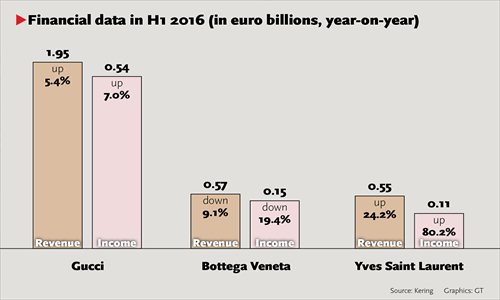
Early entrants hit hardest by weak economy, corruption crackdown
International luxury brands are still at low ebb in China, experts noted on Tuesday, though some have managed to break through by means of innovation.
Global luxury brands, including Italian fashion icon Gucci and UK-based Burberry, closed nearly 10 shops in the Chinese mainland in the first six months of 2016, the Shenzhen Special Zone Daily reported on July 26.
While China's luxury market has warmed up a bit in 2016, it's still far from its glory days of several years ago, said a fashion industry commentator who also works for a French luxury jewel brand. The insider would only give the name of Meng.
The so-called classic fashion brands, which entered the Chinese market earlier and gained wider popularity, have been hit harder by the industry's downturn, Meng said.
It's very difficult for these labels to recapture their brilliant past, particularly their business peak, which was around 2010-12, according to Meng.
"Their upswing is over. Younger brands can more easily achieve a rise in their customer base," Meng told the Global Times on Tuesday.
Italian luxury brand Prada, which entered the mainland market more than 10 years ago, is among those grappling with changed fortunes. Prada's net sales slumped 7 percent year-on-year to 2.49 billion euros ($2.82 billion) in fiscal 2015, which ended January 31, according to Prada Group's results published in April.
Prada Group's net sales in China slumped 22 percent in fiscal 2015.
The Prada Group, which includes other brands like Miu Miu, said the "negative" economic situation in the Chinese market has weighed on the company's business performance.
Another French luxury brand, Louis Vuitton, closed six stores in 2015 and two stores in March in China, the Beijing Times reported on March 11.
Zhou Huaishan, founder of the Beijing-based Yishang Think Tank, told the Global Times on Tuesday that many factors have chilled sales of luxury products in China, such as the weak economy and the government crackdown on corruption.
However, there are also luxury brands that have achieved success in 2016. For example, Gucci reported revenue of 1.95 billion euros in the first half of 2016, up from 1.87 billion euros a year earlier, according to a July statement of apparel and accessories company Kering, where Gucci belongs.
The statement said the brand had a "solid performance" in the Chinese mainland, particularly in major cities.
"Gucci's products are very popular among Chinese customers. Now a customer must pay in full, three or four months in advance, to buy many Gucci items," Meng said.
Yves Saint Laurent (YSL), another French luxury brand which has a lower profile in China, said revenues rose 24.2 percent year-on-year to 547.9 million euros in the first six months of 2016. All of the brand's geographic regions saw revenue increases during the period, according to the Kering statement.
According to Meng, the ability to innovate is the key to whether a luxury brand can maintain its success.
"Gucci achieved great success after it hired a new designer in 2015, who has brought many changes to the brand's traditional design style and the changes are well received by the customers," she said.
"The same goes for YSL: if one looks at the brand's early-stage products and its current products, he will see that the brand's core has completely changed," Meng noted, adding that the brand has also done a lot to cater for the needs of younger customers.
Some luxury brands are also trying out new sales channels in China.
French luxury brand Dior, for -example, sold a special-edition handbag for Qixi, known as Chinese Valentine's Day, via the WeChat platform. The handbags sold out in just 12 hours, according to the Beijing Business Today on August 10.
Zhou said that the Chinese luxury market will be stable in the future.
"There won't be any 'explosive growth' anymore," Zhou said.


















































